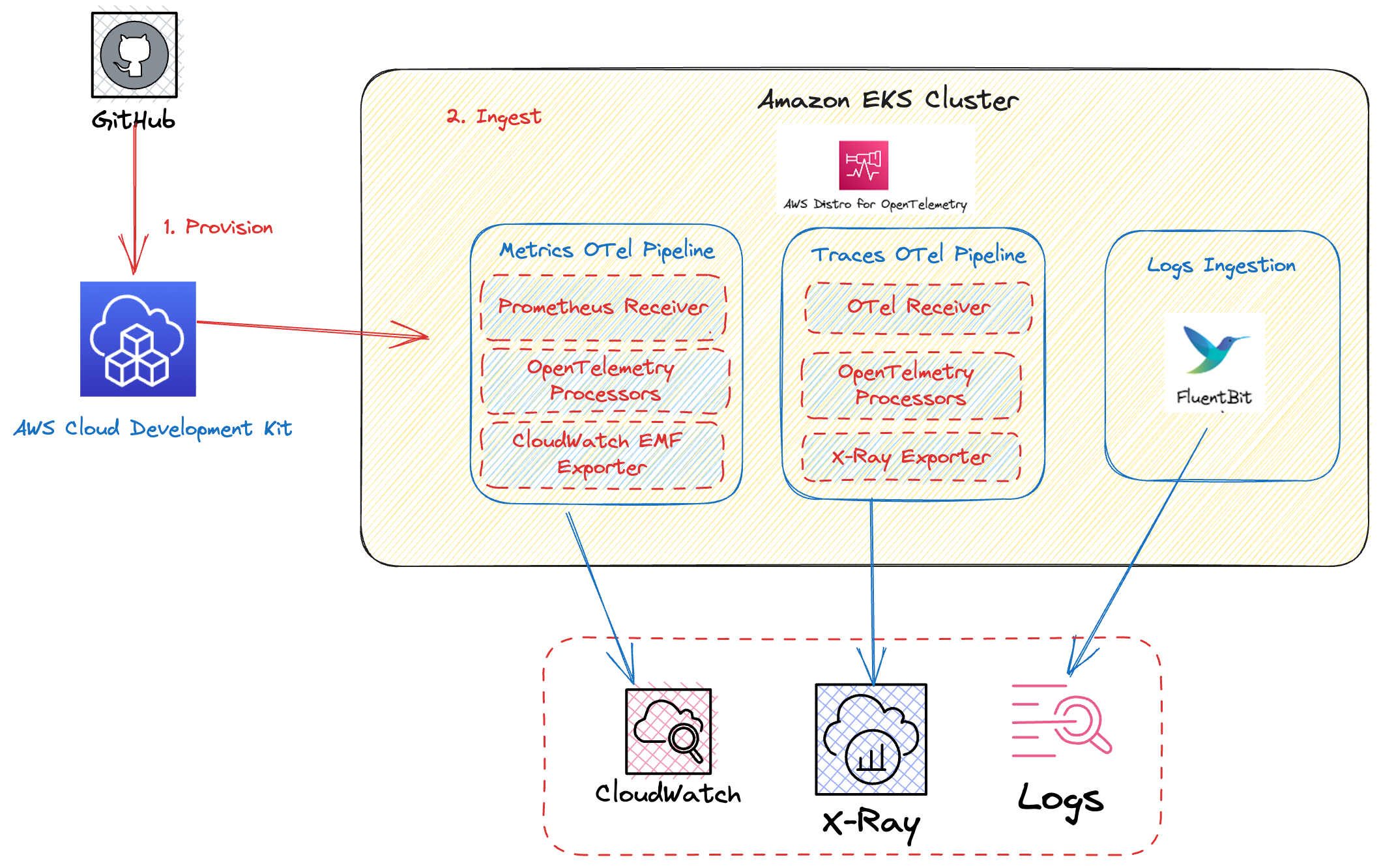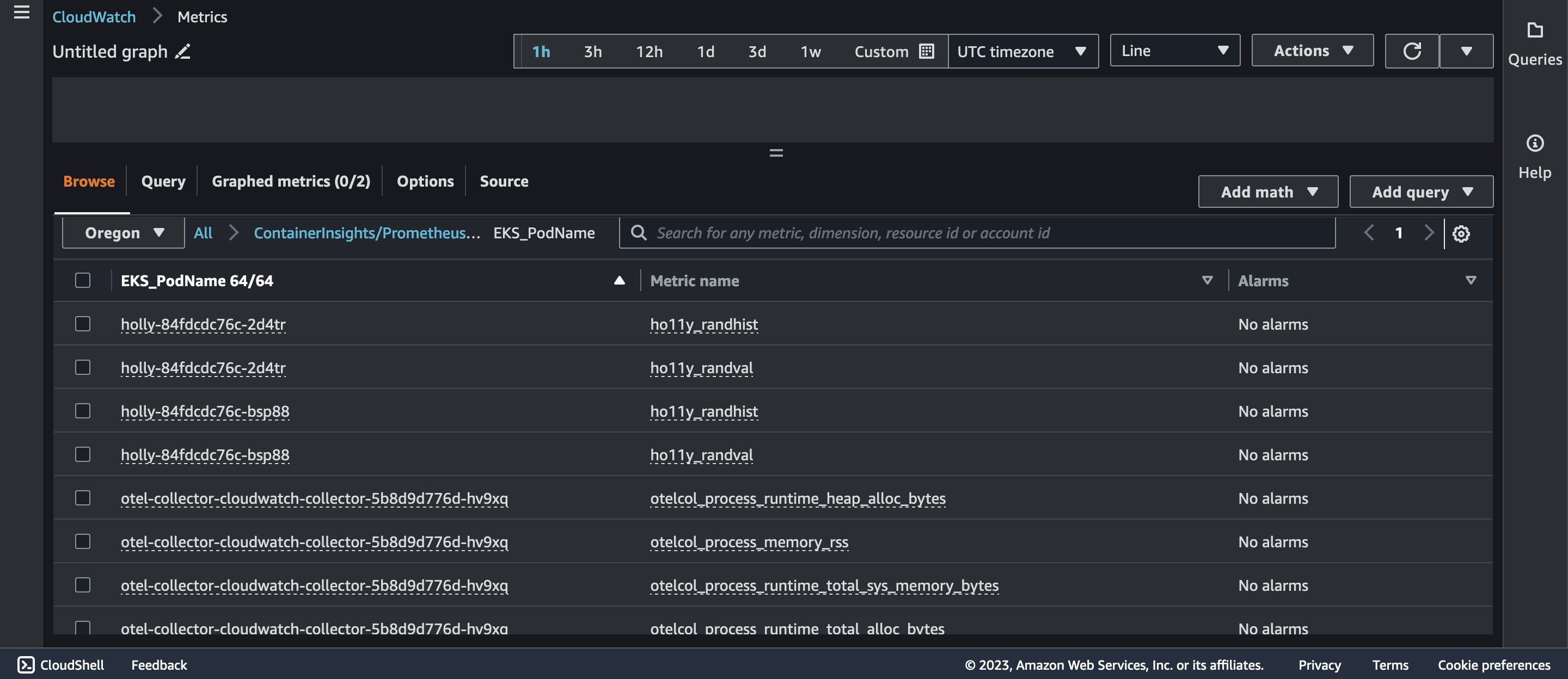Fargate Observability Pattern
Architecture¤
The following figure illustrates the architecture of the pattern we will be deploying for Single EKS Fargate Cluster Native Observability pattern using AWS native tools such as CloudWatch Logs and Container Insights.

This example makes use of CloudWatch Container Insights as a vizualization and metric-aggregation layer. Amazon CloudWatch Container Insights helps customers collect, aggregate, and summarize metrics and logs from containerized applications and microservices. Metrics data is collected as performance log events using the embedded metric format. These performance log events use a structured JSON schema that enables high-cardinality data to be ingested and stored at scale. From this data, CloudWatch creates aggregated metrics at the cluster, node, pod, task, and service level as CloudWatch metrics. The metrics that Container Insights collects are available in CloudWatch automatic dashboards.
AWS Distro for OpenTelemetry (ADOT) is a secure, AWS-supported distribution of the OpenTelemetry project. With ADOT, users can instrument their applications just once to send correlated metrics and traces to multiple monitoring solutions. With ADOT support for CloudWatch Container Insights, customers can collect system metrics such as CPU, memory, disk, and network usage from Amazon EKS clusters running on Amazon Elastic Cloud Compute (Amazon EC2), providing the same experience as Amazon CloudWatch agent. In EKS Fargate networking architecture, a pod is not allowed to directly reach the kubelet on that worker node. Hence, the ADOT Collector calls the Kubernetes API Server to proxy the connection to the kubelet on a worker node, and collect kubelet’s cAdvisor metrics for workloads on that node.
By combining Container Insights and CloudWatch logs, we are able to provide a foundation for EKS (Amazon Elastic Kubernetes Service) Observability. Monitoring EKS for metrics has two categories: the control plane and the Amazon EKS nodes (with Kubernetes objects). The Amazon EKS control plane consists of control plane nodes that run the Kubernetes software, such as etcd and the Kubernetes API server. To read more on the components of an Amazon EKS cluster, please read the service documentation.
Objective¤
- Deploys one production grade Amazon EKS Fargate cluster
- Enables Control Plane Logging.
- Logs with CloudWatch Logs
- Enables CloudWatch Container Insights.
- Installs Prometheus Node Exporter and Metrics Server for infrastructure metrics.
Prerequisites:¤
Ensure that you have installed the following tools on your machine.
Deploying¤
- Clone your forked repository
git clone https://github.com/aws-observability/cdk-aws-observability-accelerator.git
- Install the AWS CDK Toolkit globally on your machine using
npm install -g aws-cdk
-
Install project dependencies by running
npm installin the main folder of this cloned repository -
Once all pre-requisites are set you are ready to deploy the pipeline. Run the following command from the root of this repository to deploy the pipeline stack:
make build
make pattern single-new-eks-awsnative-fargate-observability deploy
Verify the resources¤
Run update-kubeconfig command. You should be able to get the command from CDK output message.
aws eks update-kubeconfig --name single-new-eks-awsnative-fargate-observability-accelerator --region <your region> --role-arn arn:aws:iam::xxxxxxxxx:role/single-new-eks-awsnative-singleneweksawsnativeobs-xxxxxxxx
Let’s verify the resources created by steps above.
kubectl get nodes -o wide
Output:
NAME STATUS ROLES AGE VERSION INTERNAL-IP EXTERNAL-IP OS-IMAGE KERNEL-VERSION CONTAINER-RUNTIME
fargate-ip-10-0-102-84.ec2.internal Ready <none> 15m v1.27.1-eks-2f008fe 10.0.102.84 <none> Amazon Linux 2 5.10.184-175.749.amzn2.x86_64 containerd://1.6.6
fargate-ip-10-0-124-175.ec2.internal Ready <none> 12m v1.27.1-eks-2f008fe 10.0.124.175 <none> Amazon Linux 2 5.10.184-175.749.amzn2.x86_64 containerd://1.6.6
fargate-ip-10-0-126-244.ec2.internal Ready <none> 15m v1.27.1-eks-2f008fe 10.0.126.244 <none> Amazon Linux 2 5.10.184-175.749.amzn2.x86_64 containerd://1.6.6
fargate-ip-10-0-132-165.ec2.internal Ready <none> 12m v1.27.1-eks-2f008fe 10.0.132.165 <none> Amazon Linux 2 5.10.186-179.751.amzn2.x86_64 containerd://1.6.6
fargate-ip-10-0-159-96.ec2.internal Ready <none> 15m v1.27.1-eks-2f008fe 10.0.159.96 <none> Amazon Linux 2 5.10.186-179.751.amzn2.x86_64 containerd://1.6.6
fargate-ip-10-0-170-28.ec2.internal Ready <none> 14m v1.27.1-eks-2f008fe 10.0.170.28 <none> Amazon Linux 2 5.10.186-179.751.amzn2.x86_64 containerd://1.6.6
fargate-ip-10-0-173-57.ec2.internal Ready <none> 15m v1.27.1-eks-2f008fe 10.0.173.57 <none> Amazon Linux 2 5.10.186-179.751.amzn2.x86_64 containerd://1.6.6
fargate-ip-10-0-175-87.ec2.internal Ready <none> 15m v1.27.1-eks-2f008fe 10.0.175.87 <none> Amazon Linux 2 5.10.186-179.751.amzn2.x86_64 containerd://1.6.6
fargate-ip-10-0-187-27.ec2.internal Ready <none> 15m v1.27.1-eks-2f008fe 10.0.187.27 <none> Amazon Linux 2 5.10.186-179.751.amzn2.x86_64 containerd://1.6.6
fargate-ip-10-0-188-225.ec2.internal Ready <none> 15m v1.27.1-eks-2f008fe 10.0.188.225 <none> Amazon Linux 2 5.10.186-179.751.amzn2.x86_64 containerd://1.6.6
fargate-ip-10-0-189-234.ec2.internal Ready <none> 15m v1.27.1-eks-2f008fe 10.0.189.234 <none> Amazon Linux 2 5.10.186-179.751.amzn2.x86_64 containerd://1.6.6
fargate-ip-10-0-96-29.ec2.internal Ready <none> 15m v1.27.1-eks-2f008fe 10.0.96.29 <none> Amazon Linux 2 5.10.184-175.749.amzn2.x86_64 containerd://1.6.6
kubectl get pods -o wide -A
NAMESPACE NAME READY STATUS RESTARTS AGE IP NODE NOMINATED NODE READINESS GATES
cert-manager cert-manager-875c7579b-5kzg5 1/1 Running 0 17m 10.0.188.225 fargate-ip-10-0-188-225.ec2.internal <none> <none>
cert-manager cert-manager-cainjector-7bb6786867-xrtbx 1/1 Running 0 17m 10.0.102.84 fargate-ip-10-0-102-84.ec2.internal <none> <none>
cert-manager cert-manager-webhook-79d574fbd5-9b7mx 1/1 Running 0 17m 10.0.187.27 fargate-ip-10-0-187-27.ec2.internal <none> <none>
default otel-collector-cloudwatch-collector-65bb5d7cb6-x8gdl 1/1 Running 1 (114s ago) 14m 10.0.132.165 fargate-ip-10-0-132-165.ec2.internal <none> <none>
default otel-collector-xray-collector-796b57b657-tnx86 1/1 Running 0 14m 10.0.124.175 fargate-ip-10-0-124-175.ec2.internal <none> <none>
kube-system aws-load-balancer-controller-8dcffbf6c-6qgfn 1/1 Running 0 17m 10.0.96.29 fargate-ip-10-0-96-29.ec2.internal <none> <none>
kube-system aws-load-balancer-controller-8dcffbf6c-dgqn6 1/1 Running 0 17m 10.0.189.234 fargate-ip-10-0-189-234.ec2.internal <none> <none>
kube-system blueprints-addon-metrics-server-6765c9bc59-v98h5 1/1 Running 0 17m 10.0.175.87 fargate-ip-10-0-175-87.ec2.internal <none> <none>
kube-system coredns-788dbcccd5-7lf2g 1/1 Running 0 17m 10.0.173.57 fargate-ip-10-0-173-57.ec2.internal <none> <none>
kube-system coredns-788dbcccd5-wn8nc 1/1 Running 0 17m 10.0.126.244 fargate-ip-10-0-126-244.ec2.internal <none> <none>
kube-system kube-state-metrics-7f4b8b9f5-g994r 1/1 Running 0 17m 10.0.159.96 fargate-ip-10-0-159-96.ec2.internal <none> <none>
opentelemetry-operator-system opentelemetry-operator-5fbdd4f5f9-lm2nf 2/2 Running 0 16m 10.0.170.28 fargate-ip-10-0-170-28.ec2.internal <none> <none>
kubectl get ns # Output shows all namespace
NAME STATUS AGE
aws-for-fluent-bit Active 17m
cert-manager Active 17m
default Active 27m
kube-node-lease Active 27m
kube-public Active 27m
kube-system Active 27m
opentelemetry-operator-system Active 17m
Viewing Logs¤
By default, we deploy a FluentBit daemon set in the cluster to collect worker logs for all namespaces. Logs are collected and exported to Amazon CloudWatch Logs, which enables you to centralize the logs from all of your systems, applications, and AWS services that you use, in a single, highly scalable service.
Using CloudWatch Logs Insights to Query Logs¤
Navigate to CloudWatch, then go to "Logs Insights"
In the dropdown, select any of the logs that begin with "/aws/eks/single-new-eks-awsnative-fargate-observability-accelerator" and run a query.
Example with "kubesystem" log group:

Then you can view the results of your query:

Viewing Metrics¤
Metrics are collected by the cloudWatchAdotAddon as based on the metricsNameSelectors we defined (default ['apiserver_request_.*', 'container_memory_.*', 'container_threads', 'otelcol_process_.*']). These metrics can be found in the Cloudwatch metrics dashboard.
Navigate to Cloudwatch, then go to "Metrics"
Select "All Metrics" from the dropdown and select any logs in the ContainerInsights namespace
Example with "EKS_Cluster" metrics

Monitoring workloads on EKS¤
Although the default metrics exposed by cloudWatchAdotAddon are useful for getting some standardized metrics from our application we often instrument our own application with OLTP to expose metrics. Fortunately, the otel-collector-cloudwatch-collector can be specified as the endpoint for collecting these metrics and getting metrics and logs to cloudwatch.
We will be fetching metrics from ho11y a synthetic signal generator allowing you to test observability solutions for microservices. It emits logs, metrics, and traces in a configurable manner.
Deploying Workload¤
cat << EOF | kubectl apply -f -
apiVersion: v1
kind: Namespace
metadata:
name: ho11y
---
apiVersion: apps/v1
kind: Deployment
metadata:
name: frontend
namespace: default
spec:
selector:
matchLabels:
app: frontend
replicas: 1
template:
metadata:
labels:
app: frontend
spec:
containers:
- name: ho11y
image: public.ecr.aws/z0a4o2j5/ho11y:latest
ports:
- containerPort: 8765
env:
- name: DISABLE_OM
value: "on"
- name: HO11Y_LOG_DEST
value: "stdout"
- name: OTEL_RESOURCE_ATTRIB
value: "frontend"
- name: OTEL_EXPORTER_OTLP_ENDPOINT
value: "otel-collector-cloudwatch-collector.default.svc.cluster.local:4317"
- name: HO11Y_INJECT_FAILURE
value: "enabled"
- name: DOWNSTREAM0
value: "http://downstream0"
- name: DOWNSTREAM1
value: "http://downstream1"
imagePullPolicy: Always
---
apiVersion: apps/v1
kind: Deployment
metadata:
name: downstream0
namespace: default
spec:
selector:
matchLabels:
app: downstream0
replicas: 1
template:
metadata:
labels:
app: downstream0
spec:
containers:
- name: ho11y
image: public.ecr.aws/mhausenblas/ho11y:stable
ports:
- containerPort: 8765
env:
- name: DISABLE_OM
value: "on"
- name: HO11Y_LOG_DEST
value: "stdout"
- name: OTEL_RESOURCE_ATTRIB
value: "downstream0"
- name: OTEL_EXPORTER_OTLP_ENDPOINT
value: "otel-collector-cloudwatch-collector.default.svc.cluster.local:4317"
- name: DOWNSTREAM0
value: "https://mhausenblas.info/"
imagePullPolicy: Always
---
apiVersion: apps/v1
kind: Deployment
metadata:
name: downstream1
namespace: default
spec:
selector:
matchLabels:
app: downstream1
replicas: 1
template:
metadata:
labels:
app: downstream1
spec:
containers:
- name: ho11y
image: public.ecr.aws/mhausenblas/ho11y:stable
ports:
- containerPort: 8765
env:
- name: DISABLE_OM
value: "on"
- name: HO11Y_LOG_DEST
value: "stdout"
- name: OTEL_RESOURCE_ATTRIB
value: "downstream1"
- name: OTEL_EXPORTER_OTLP_ENDPOINT
value: "otel-collector-cloudwatch-collector.default.svc.cluster.local:4317"
- name: DOWNSTREAM0
value: "https://o11y.news/2021-03-01/"
- name: DOWNSTREAM1
value: "DUMMY:187kB:42ms"
- name: DOWNSTREAM2
value: "DUMMY:13kB:2ms"
imagePullPolicy: Always
---
apiVersion: v1
kind: Service
metadata:
name: frontend
namespace: default
annotations:
scrape: "true"
spec:
type: LoadBalancer
ports:
- port: 80
targetPort: 8765
selector:
app: frontend
---
apiVersion: v1
kind: Service
metadata:
name: downstream0
namespace: default
annotations:
scrape: "true"
spec:
ports:
- port: 80
targetPort: 8765
selector:
app: downstream0
---
apiVersion: v1
kind: Service
metadata:
name: downstream1
namespace: default
annotations:
scrape: "true"
spec:
ports:
- port: 80
targetPort: 8765
selector:
app: downstream1
---
EOF
To verify the Pod was successfully deployed, please run:
kubectl get pods
kubectl get pods
NAME READY STATUS RESTARTS AGE
downstream0-6b665bbfd-6zdsb 1/1 Running 0 61s
downstream1-749d75f6c-9t5dl 1/1 Running 0 61s
frontend-557fd48b4f-gx8ff 1/1 Running 0 61s
Once deployed you will be able to monitor the Ho11y metrics in cloudwatch as shown:

Teardown¤
You can teardown the whole CDK stack with the following command:
make pattern single-new-eks-awsnative-fargate-observability destroy